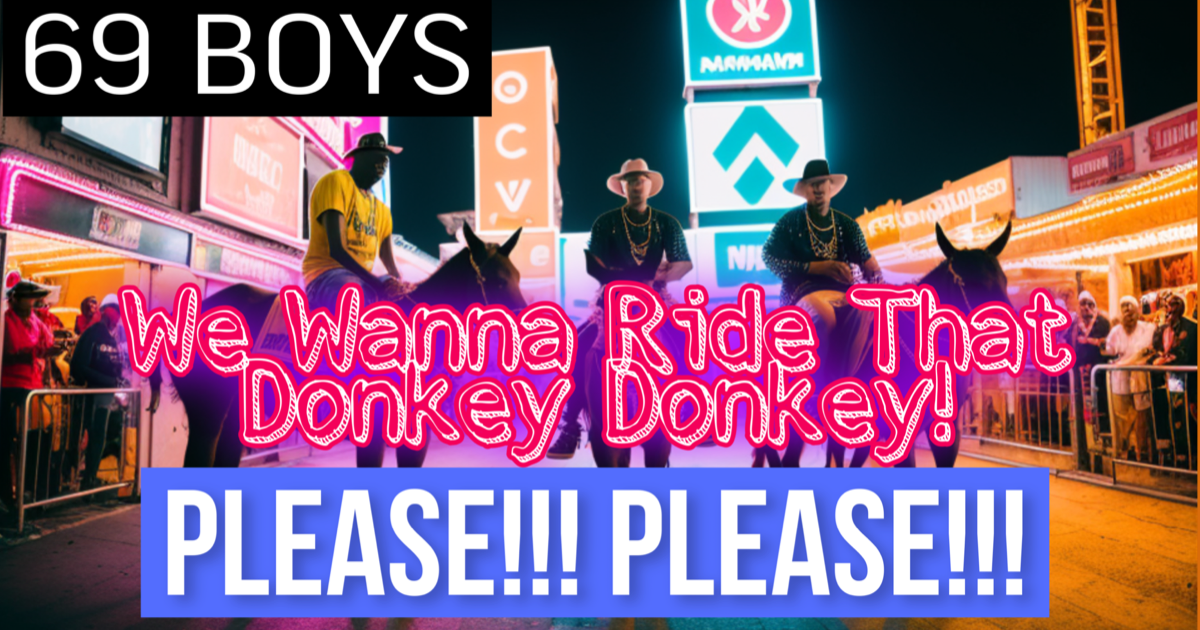No products in the cart.
Return To Shop69Boys: Humble Rap Group Shunned Fancy Whips & Instead Begged to Ride Donkey
Why did the 69 boys want to ride a donkey so bad that they would beg for it?
The Cultural Significance of Donkeys in Different Societies
In many cultures and societies, donkeys hold a special significance as a symbol of humility and endurance. However, for a group of young boys, riding a donkey was more than just a cultural tradition. They begged and pleaded for a chance to ride a donkey, seeing it as a status symbol and a thrilling adventure. This article explores the motivations behind their desire for donkey rides, examining cultural, psychological, and economic factors that may have contributed to their obsession. Additionally, we will dive into the ethics of animal tourism and look for alternative ways to meet the needs of tourists while also protecting the well-being of these beloved animals.
The Cultural Significance of Donkeys in Different Societies
Donkeys have played a significant role in various cultures throughout history. In many societies, they are viewed as a symbol of humility and endurance. Donkeys are known for their hardworking nature, and they are often used for transportation, farming, and other manual labor. They have been a crucial part of life in many rural communities and continue to be so.
Donkeys as a Symbol of Humility and Endurance
Donkeys have been associated with humility and endurance for centuries. In many cultures, they are considered a humble animal, and their willingness to work long hours without complaint or rest has made them a symbol of perseverance and hard work.
Donkeys in Religious and Mythological Contexts
In many religious and mythological contexts, donkeys have played a significant role. For example, in Christianity, a donkey was present during the birth of Jesus and is seen as a symbol of peace and humility. In Greek mythology, donkeys were associated with Dionysus, the god of wine, and were believed to be a symbol of fertility and abundance.
Understanding the Boy’s Perception of Donkeys as a Status Symbol
For some children, donkeys are seen as a status symbol. This perception is influenced by the cultural context in which they live, as well as Western perceptions of donkey riding.
Donkey Riding as a Status Symbol in Local Communities
In some local communities, donkey riding is viewed as a symbol of status and wealth. This is particularly true in rural areas where donkeys are used for transportation and agricultural purposes. The ownership of a donkey can signify a family’s wealth and social standing.
The Influence of Western Perception on Donkey Riding
Western tourists often see donkey riding as a fun and adventurous activity, which has influenced local perceptions of donkey riding. As a result, donkey riding has become more popular and is often promoted as a tourist activity in many local communities.
The Role of Peer Pressure in the Boys’ Decision to Beg for Donkey Rides
Peer pressure can be a powerful force that influences children’s behavior, and it likely played a role in the boys’ decision to beg for donkey rides.
The Psychology of Peer Pressure
Peer pressure refers to the influence that peers can have on an individual’s behavior, attitudes, and beliefs. Children can feel peer pressure to conform to group norms, even if those norms go against their own values or desires.
How Peer Pressure Relates to the Boys’ Desires for Donkey Rides
The boys may have felt pressure from their peers to ride a donkey because it was seen as a fun and adventurous activity. They may have also felt pressure to conform to local cultural norms and the perception of donkey riding as a status symbol.
Examining the Psychological Motivations Behind the Boys’ Desires to Ride a Donkey
There were likely several psychological motivations behind the boys’ desires to ride a donkey, including the thrill of adventure and risk-taking, as well as childhood fantasies and dreams.
The Thrill of Adventure and Risk-Taking
Children are naturally curious and enjoy exploring new things and taking risks. Riding a donkey may have been seen as a thrilling and exciting experience for the boys.
Childhood Fantasies and Dreams
Children often have vivid imaginations and enjoy fantasizing about different scenarios. The idea of riding a donkey may have been a childhood dream for the boys, and they may have felt a sense of accomplishment in achieving that dream.
The Impact of Social Media and Pop Culture on the Boys’ Perception of Donkeys
Donkey Memes and Trends on Social Media
Social media plays a significant role in shaping today’s pop culture. Social media platforms like Instagram, Twitter, and TikTok have seen a growing trend of donkey-related memes and content. This trend might have influenced the boys to seek a donkey ride in the first place.
The Portrayal of Donkeys in Popular Media
Donkeys have been portrayed in popular media as stubborn, clumsy, and even comical. Examples like the character of Donkey in “Shrek” or the “Eeyore” character from “Winnie-the-Pooh” have added to the comical perception of donkeys. However, these portrayals might have also contributed to the boys’ obsession with donkey rides, as they were looking for a fun and entertaining experience.
Analyzing the Economic Factors that May Have Contributed to the Boys’ Obsession with Donkey Rides
The Importance of Donkey Rides for the Local Economy
Donkey rides are a significant source of income for many local economies, especially in tourist hotspots. The need to boost their local economies by attracting tourists looking for novel experiences might have encouraged the donkey ride business in the boys’ area.
How Tourist Demand Shapes Local Economies and Cultures
Tourist demands and trends influence the development of local economies and cultures. In this case, the boys’ obsession with donkey rides could be traced back to the increasing demand for unique and thrilling tourist experiences.
Exploring the Ethics of Animal Tourism and Its Impact on Donkey Populations
The Risks of Overworking Donkeys in Tourism
Animal welfare organizations across the world have noted the risks and dangers of overworking donkeys in tourism. These animals are often subjected to long working hours and harsh conditions, leading to potential injuries or even death. This raises a concern about the ethical implications of the boys’ obsession with donkey rides.
Alternative Forms of Sustainable Tourism for Local Economies
Sustainable tourism practices can help address the ethical concerns surrounding animal tourism. Such practices include responsible animal tourism, eco-tourism, and cultural tourism. By promoting alternative forms of tourism, local economies can ensure that they are not exploiting animal populations while still catering to visitors’ needs.
Seeking Alternatives to Donkey Rides for Thrill-Seeking Tourists
The Rise of Eco-Tourism and Adventure Tourism
Eco-tourism and adventure tourism are among the fast-growing trends in the tourism industry. These forms of tourism offer exciting and memorable experiences while ensuring that nature and animal conservation are not compromised. By promoting these forms of tourism, local economies can diversify their offerings while still providing tourists with a unique and thrilling experience.
Opportunities for Experiential Learning and Cultural Exchange
Cultural exchange programs and experiential learning opportunities are gaining popularity globally. These programs offer tourists the chance to immerse themselves in the local culture and learn about the community’s livelihoods and traditions. By promoting these programs, local economies can attract visitors who are looking for immersive experiences while also providing them with an educational and enlightening experience.In conclusion, while the desire to ride a donkey may seem harmless and innocent, it is important to consider the impact that this tourism activity has on the well-being of the animals involved. By exploring alternative forms of tourism and promoting sustainable practices, we can ensure that donkeys and other animals are treated with respect and dignity. By doing so, we can preserve the cultural significance of these animals while also promoting responsible tourism practices that benefit both local communities and travelers.
FAQ
What is the significance of donkeys in different cultures and societies?
Donkeys have been revered by many cultures as a symbol of humility and hard work. In some cultures, they are seen as a symbol of endurance and perseverance, while in others, they have religious or mythological significance.
Why do children and adults enjoy riding donkeys?
Donkey rides can be an exciting and thrilling adventure for children and adults alike. They offer a unique way to experience local cultures and can create lasting memories. However, it is important to consider the well-being of the animals involved in these activities.
What are the ethical concerns surrounding donkey rides and animal tourism?
There are several ethical concerns surrounding animal tourism, including overworking animals and neglecting their needs. It is important to promote sustainable tourism practices that prioritize the well-being of animals and support local communities.
What are some alternative forms of tourism that promote sustainability and support local communities?
Alternative forms of tourism include eco-tourism, cultural tourism, and adventure tourism. These forms of tourism prioritize responsible and sustainable practices, allowing travelers to experience local cultures and natural environments in a way that supports local communities and protects the well-being of animals.
Understanding the Boys Perception of Donkeys as a Status Symbol
The Role of Peer Pressure in the Boys Decision to Beg for Donkey Rides
Examining the Psychological Motivations Behind the Boys Desires to Ride a Donkey
The Impact of Social Media and Pop Culture on the Boys Perception of Donkeys
Analyzing the Economic Factors that May Have Contributed to the Boys Obsession with Donkey Rides
Exploring the Ethics of Animal Tourism and Its Impact on Donkey Populations
Seeking Alternatives to Donkey Rides for Thrill-Seeking Tourists.







2 comments
qcsymytdfb
Muchas gracias. ?Como puedo iniciar sesion?
capicapi
Yo no entiendo k inciniar.